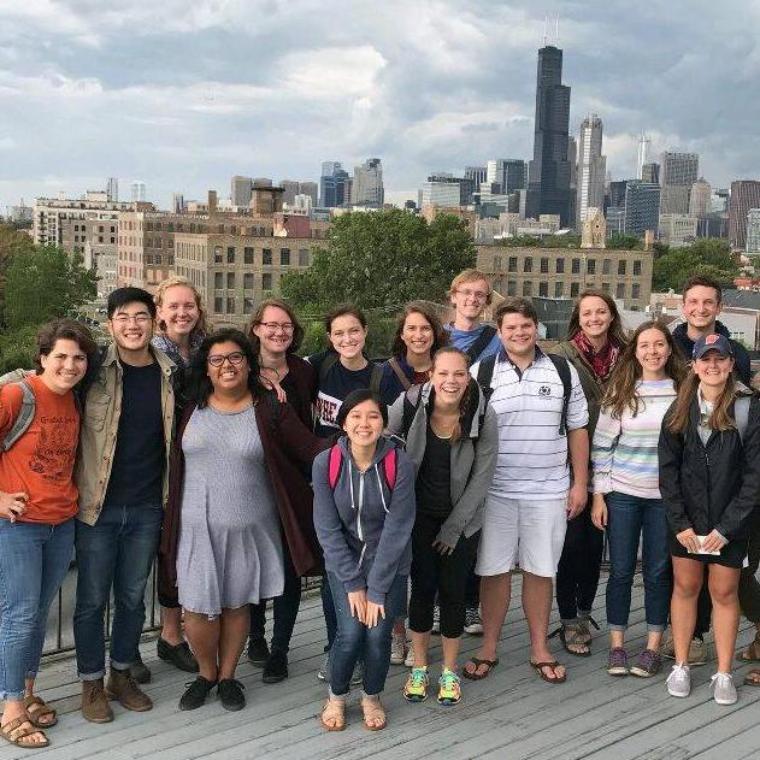
The Aequitas Program in Urban Leadership (the Aequitas Program) is a four-year, cohort-based, experiential program that educates Wheaton College students to promote just, sustainable, and flourishing urban communities through academic study, experiential learning, immersion programs, and Christian service.
Aequitas Program Overview
While the Aequitas Program is interdisciplinary, involving faculty and students from every academic division, all students will graduate from the program conversant with ethics and economics, especially as they intersect with the realities – both the challenges and opportunities – of urban life, and able to articulate a framework of evangelical theological convictions that grounds their work in the program. By the end of the program, Aequitas Fellows will have demonstrated competence in applying ethical and economic reasoning to urban challenges, such as poverty, food insecurity, housing, public health, environmental sustainability, employment, and economic development within the context of evangelical public and political theology.
Aequitas Fellows
Aequitas will admit 10-20 students – Aequitas Fellows – from among the most qualified applicants to Wheaton College. Each Aequitas Fellow receives a combination of a merit scholarship and other funded experiences equivalent to $5,000 per year.
Aequitas Program Details
The Aequitas Program begins with Wheaton’s first-year transition program and ends with a capstone project undertaken by the cohort. A single cohort’s experience can be traced through four themed years described below:
- Aequitas Fellows begin their Wheaton experience in the Urban Track of Wheaton Passage, which includes a significant community service component.
- Aequitas Fellows complete two key courses in the first year
- First Year Seminar: What is a Thriving City? (Fall semester) introduces students to key questions and concepts in the interdisciplinary study of cities, focusing on six “endowments:”
- The Good: The Realm of Social Mores and Ethics
- The True: The Realm of Human Knowledge and Learning
- The Beautiful: The Realm of Aesthetics, Design, and the Arts
- The Just and Well Ordered: The Realm of Political and Civic Affairs
- The Prosperous: The Realm of Economic Life
- The Sustainable: The Realm of Natural and Physical Health
- The Social Life of Cities (either semester, but preferably spring) – the prerequisite for Wheaton in Chicago – introduces students to social science-perspectives on cities and their associated social phenomena, while crafting a biblically informed perspective upon various urban issues.
- Late in the spring semester, Aequitas Fellows have a retreat together to bring closure to their first year in the program and look forward to the next three years.
- Aequitas Fellows complete an appropriate economics sequence of 6-10 credit hours (e.g., Microeconomics and Macroeconomics + other optional elective courses).
- Aequitas Fellows will meet regularly with the program director to discuss readings on the theme of leadership.
- Aequitas Fellows will be encouraged to participate in a ministry of the Christian Service Council or Chicago Evangelism Team.
- In summer between their second and third years, Aequitas Fellows together complete a leadership development trajectory structured to move students from (1) being mentored to (2) leading the transition of younger students into the College and Aequitas (which also aids in cross-cohort community-building) to (3) facilitating discussion groups of their peers during their Wheaton in Chicago semester, when they will assist in leading conversations about the readings and reflections included in our Civitas. The summer includes:
- funded study and service in multiple international urban contexts;
- and preferential selection to staff Urban Track of Passage.
Aequitas Fellows complete Wheaton in Chicago, a semester-long, residential, experiential program based in Woodlawn in either the fall or spring semester. During their Wheaton in Chicago experience, students complete the following:
- Required courses
- Theologies of Transformation: Public & Political Theologies in Urban Context
- A Practicum or Internship that pairs practical work experience with disciplined reflection (using Civitas: A Program of Vocational Exploration and Discernment) and mentoring. Internships for Aequitas Fellows will be paid work-based learning experiences that (1) require students to deepen their experience in and reflection upon the relationship between ethics and economics in the urban context and (2) expose students to the ways in which strategy is developed and implemented in an urban context.
- Elective courses
- Chicago
- Race, Poverty, and Reconciliation
- Community Economic Development & Enterprise
- Engaging Arts in City
- Writing Chicago
- Excursions
- To the Christian Community Development Association conference, which has been a fixture of our fall semester programming for a decade
- To Los Angeles, which will be included in our spring semester programming specifically to connect with and learn from communities that can help us to understand the Latino urban experience in the American southwest
- Community engagement, spiritual formation, student life programming, and student leadership opportunities
- Aequitas Fellows complete a group capstone project in which they take on an interdisciplinary, applied challenge of interest to a community partner, producing a joint project or agenda-setting report.
- Beginning in the fall semester, students will work closely with the Center for Vocation and Career, their Aequitas advisor, Aequitas alumni, and the CUE Community Engagement Council to ensure they have a plan in place for their next steps after graduation.
- Aequitas Fellows and others will present their project deliverable at a Center for Urban Engagement symposium that includes college audiences, public interlocutors, community partners, and others.
- Aequitas Fellows will celebrate the completion of the program at a banquet in April of the fourth year.
- Aequitas Fellows participate in the Aequitas Forum – three all-cohort gatherings per year. These would include:
- A September event that gathers all cohorts.
- Special engagements with two guests giving public lectures – one on the topic one on ethics, broadly defined, and one on economics, broadly defined. The Center for Urban Engagement will fund an exclusive roundtable and/or meal with the speaker for Aequitas Fellows. Speakers addressing the topic of the senior cohort’s capstone project would be available for a full day of engagement with the Aequitas Fellows.
- Aequitas Fellows receive invitations to participate in optional dinners at the program director’s home and optional cross-cohort small groups.
- Aequitas Fellows are mentored by the program director.
“As Christians, we are not only called to serve Christ by serving those in need, we are bound to do so with relevance. Too often, we cling to heart-felt rhetoric that leads to simplistic solutions. But the challenges are complex and multilayered, caught up in history, social systems and political and economic structures. We must balance the urgency of helping one individual at a time with the patience to address systemic issues. We must prepare students with commitment and rigor to understand the issues and to advance solutions that will have a lasting and substantial impact.”
— Steven C. Preston, Wheaton College Trustee and former Secretary of Housing and Urban Development
Aequitas Student Selection
Aequitas is a highly selective program. We seek students with superb academic records, demonstrated leadership abilities, and excellent character. Aequitas works closely with Undergraduate Admissions to offer the Aequitas experience to applicants who meet the following criteria and will constitute a diverse cohort (by race, ethnicity, gender, vocational aspirations, and course of study, among other characteristics):
- Acceptance into the undergraduate program at Wheaton College;
- Demonstrated leadership abilities and Christian character;
- Outstanding academic performance
“Few mandates are as complex or high-stakes as that of developing solutions to systematic challenges faced on an urban scale. Yet, our country is not doing enough to prepare future leaders to truly understand and solve urban challenges. Wheaton’s leadership in addressing this gap through Aequitas is inspiring and necessary. I look forward to seeing Aequitas Fellows emerge as effective leaders across the globe in years to come.”
—Christy Joyce, ’10, M.A. ’14, Director of Portfolio Impact at A Better Chicago
Aequitas Personnel
Learn more about the director and faculty who support the Aequitas Program.
Indicate Your Interest in Aequitas
Interested in the program? Please fill out this form, and we will contact you with more information.

